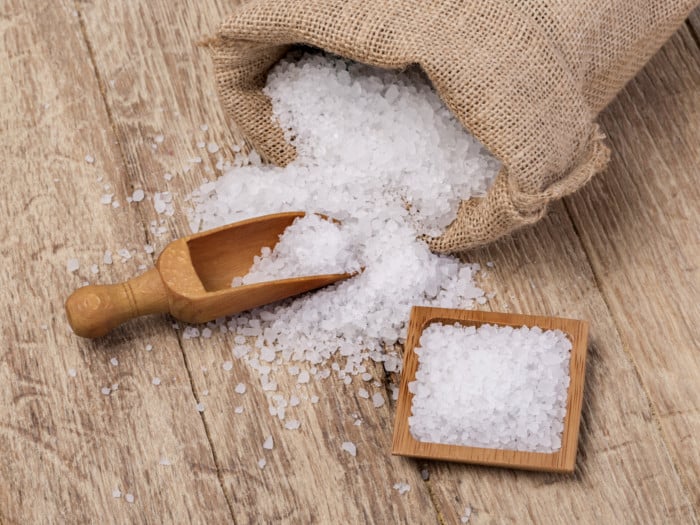Iodine is an essential micronutrient that affects a number of key processes in the body, mainly the thyroid hormones. Although there are many food sources of iodine readily available, almost 2 million people globally suffer from iodine deficiency. Research has suggested that iodized salt can help reduce this number. However, there still lies a great deal of confusion when it comes to including this salt in the diet. Let us take a look at some of the most prevailing questions around iodized salt and how can it help you.
What Is Iodized Salt?
Iodized salt is regular table salt that includes an extremely small quantity of iodine salts. It is prepared by spraying regular salt with potassium iodate. This practice began in the 1920s to fight the incidence of iodine deficiency and goiters in many countries. [1]
Research shows that prior to this discovery, about 70 percent of the children in the US had goiters. When you compare the data to this decade, about 90% of the population in the US is iodine sufficient. [2]

Iodized salt Photo Credit: Shutterstock
| Serving Size : | |
|---|---|
| Nutrient | Value |
| Water [g] | 0.42 |
| Ash [g] | 99 |
| Calcium, Ca [mg] | 50 |
| Potassium, K [mg] | 2 |
| Sodium, Na [mg] | 38700 |
| Manganese, Mn [mg] | 0.03 |
| Iodine, I [µg] | 5080 |
| Sources include : USDA [3] | |
Why Is Iodized Salt Used?
The primary reason that iodized salt has become so ubiquitous in kitchens and restaurants around the world is that it may help prevent iodine deficiency. Iodine deficiency is often characterized by goiter, an enlargement of the thyroid gland on the neck that occurs when the body is trying to get more iodine. The symptoms of this deficiency are quite serious, as thyroxine is necessary for proper brain development both in the womb and as an infant. It can also lead to cretinism and endemic goiter if left untreated, as explained in a report by the Bulletin of the World Health Organization. [4]
Iodine occurs naturally in the earth’s soil and cannot be produced by the body. Therefore, we must get the necessary amounts of iodine from the food we eat. Some of the common sources of iodine include seafood and other food sources cultivated on land that was once underwater. The constraint, however, is that these food sources cannot assure of being rich in iodine as the mineral content majorly depends on the soil they are cultivated in. To tackle this concern, many countries have implemented salt ionization programs. Also, salt is a universal ingredient in most dishes, and adding it in a small amount can help fulfill your daily iodine requirement. [5] [6] [7]
Difference Between Iodized Salt and Sea Salt
The main differences between iodized or table salt and sea salt are their taste, texture, and processing.
Iodized salt is obtained from underground deposits and it goes through innumerable processes to prevent clumping. Also, it is fortified with iodine, which helps in a healthy thyroid function.
Sea salt is produced when the ocean or seawater evaporates. It goes through minimum processing and therefore retains its minerals. It has a coarse texture.
Safety Precautions
While preventing iodine deficiency is certainly important for your overall health, you don’t want to overdo it with the salt intake. Here are a few points to consider.
- The daily recommended amount of iodine in our diet is roughly 150 micrograms, which can be acquired through as little as half a teaspoon of iodized table salt. [8]
- An excess of salt in the diet, however, may lead to high blood pressure. This can, in turn, cause a number of other health concerns affecting the heart, kidneys, and brain, as explained in an article in the Hypertension journal. [9] [10] [11]
- Excess iodine can aggravate pre-existing thyroid disease. [12]
Harvard Medical School suggests that if you are able to consume a balanced diet including seafood, dairy products, and poultry, you are probably getting enough iodine. This way you can prevent the conditions occurring because of over intake of salt. [13]
